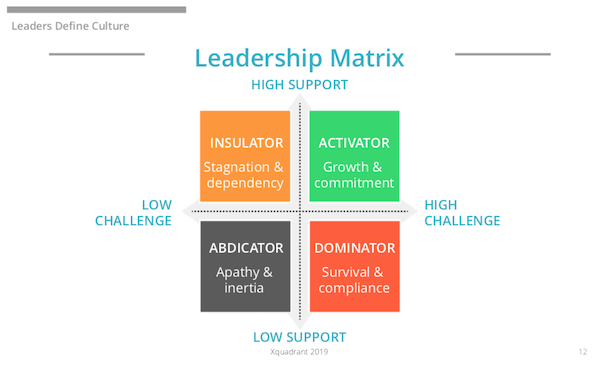If you’ve followed my writing for a while, you’ll be aware of how the leadership culture that we create is defined by the levels of support and challenge that we bring to those around us.
Support involves a sense of personal care; challenge involves stretching people out of their comfort zone. We can map out these two dimensions as follows:

The gold standard of leadership, in my view, is the Activator quadrant, when we bring high levels of support (so our people know we care about them) and high levels of challenge (so they grow and reach their potential). If you think of someone who’s been so “for you” that they’ve pushed you beyond your comfort zone, you know what a life-changing impact an Activator can have.
However, concerned about being an ol’-school dominator, many leaders shy away from challenge and find themselves in the Insulator quadrant. This is the comfort zone, where important things are being unsaid, and performance quietly stagnates.
Perhaps you, too, have overdosed on the empathy and liveability and dialled back the challenge recently.
Indeed, one member of our current Impact Accelerator cohort pinpointed this exact issue: he had been promoted a new position and realised he was relating to his team as he did when they were peers:

MARK S
"I’m being their friend, but I need to be their leader."
But how would you know if you’re backing off the challenge? Here are five ways you might be failing to stretch your team, and some ideas about where can you serve your team by bringing some ‘radical candour’.
1. You give anodyne feedback
It can be uncomfortable to give candid feedback; if you don’t deliver it right the effects can be counterproductive. As a result, many leaders often rely on dropping hints, watering down our comments, or hoping that someone else will deliver the feedback.
There are two reasons you might not be giving challenging feedback. Either you’ve build a comfortable relationship and you’re scared to risk that by bringing challenge; or you’ve not build a solid enough relationship and so you feel stuck in the ‘politeness zone’.
Where are you giving bland feedback to someone who needs a reality-check?
2. You don't close accountability loops
If you’re tolerating underperformance or poor behaviour, somewhere along the line you’ve not create and closed an accountability loop. These conversations can be difficult and, again, many leaders end up closing the performance gap themselves instead of navigating the challenging conversation. For example, they stay late and fix the issue themselves.
When somebody doesn’t follow through on a promise or a commitment, and you let it pass or compensate for it yourself, you’re training them that it’s not important and you’re providing them with a safety net.
Where are you tolerating or encouraging a lack of accountability and ownership?
3. You focus on boring goals
One common way leaders fail to bring challenge to their team is to set boring goals. Most leaders have been told to set SMART goals (specific, measurable, achievable, realistic, time-bound). This is fine on one level, and indeed as many people have financial incentives around these kind of goals, it makes sense to have this kind of clarity.
But… SMART goals are often boring. They make sense, but they don’t inspire us. They don’t have any intrinsic meaning to us. They might be SMART, but they’re not WISE … Wondrous, Inspiring, Scary and Exciting!
Create some WISE goals with your team. Find out what makes them come alive and challenge them to go big.
Who needs a WISE goal to light them up and push them out of their comfort zone?
4. Your conversations are too cosy
In the desire to be a servant leader, executives can end up creating 1:1s or team calls that are just too comfortable. The result is that people don’t necessarily bring their A-Game. Instead, raise the tension just a notch or two — you’re their leader and not their friend!
Make more use of silence and eye contact. Probe what they’re saying several layers deep. Challenge them to take a risk: be bolder, more imaginative or more vulnerable. Perhaps play Devil’s advocate: take a provocative stance, push back.
Where do you need to stop being a friend and start being a leader?
5. You keep the frame of reference too small
One way to increase challenge is to expand the frame of reference. Widen scope by considering alternative stakeholder perspectives, alternative time frames, and the bigger issues that might not be on the person’s radar.
For example, someone might be great at delivering their own results, but are they actually optimising their team’s success, or working for the business’s greater good? They might be doing well on this month’s goals, but are they building the capabilities they need for the organisation to be successful next year?
How much are you challenging the thinking of your team? Challenge them to:
- Zoom out (how is this a microcosm of something bigger? How is this dynamic played out across the organisation?)
- Zoom in (what’s the stretch here for you personally?)
- Think about the broader system-level issues at play (what’s the biggest leverage point here? What would [another stakeholder] say about this?)
Who needs to be challenged to consider the bigger picture?
What’s your challenge?
So… anodyne feedback, open loops, boring goals, cosy conversations, small thinking. What’s your challenge in all of this? Where are you being too timid in your conversations?
Strike up a conversation and let me know.



